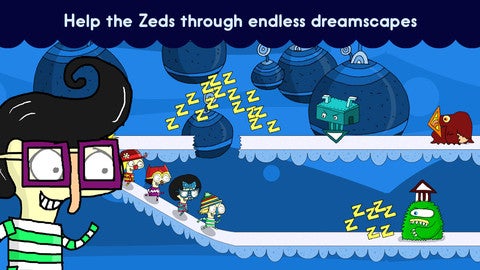Channel 4 to send teenagers to sleep with mobile app game Zeds

Normally the youth-oriented Channel 4 would try to keep its audience glued into the small hours. But the broadcaster has now launched a mobile game designed to send hyperactive teenagers to sleep in order to educate them about the benefits of an early night.
Zeds, a free app developed by the broadcaster in partnership with an Oxford University neuroscientist, is being marketed as a “fun and entertaining” method of selling sleep to heavy-lidded teens.
The app, which records and analyses users’ sleep patterns and builds a game around them, is intended to demonstrate how a lack of sleep can dull creativity, reduce energy levels and impact on young peoples’ social lives.
Players are directed to place their iPhone on the corner of their bed, allowing the app to record their sleep patterns and display the results in a graph the following morning.
The recording is translated into a platform game, saved for later or sent to a friend, in which a restless night’s sleep presents a tough challenge while deep sleep patterns are rewarded with an easier level, containing more power-ups.
Developer Chunk commissioned Bafta-award winning animation team The Brothers McLeod to design the game, and collaborated with Professor Russell Foster, Professor of Circadian Neuroscience at Oxford University, who provides an in-game explanation of different sleep patterns.
Each sleep recording creates a different “track” in the game, along which the game’s characters, the Zeds, run. In periods of restless sleep, the running environment becomes more volatile and fraught with danger.
Professor Foster, a leading expert on the effects of sleeping patterns on teenagers, said: “Anything that increases the awareness of the importance of good sleep practices, especially for this age group is very important, and I’m very supportive of it.
“If you don’t sleep properly your ability to think creatively, to solve problems, your sense of humour - everything that makes us special human organisms - is lost. Sleep needs to be at the centre of our world.”
Channel 4 believes that the smartphone, the source of sleeplessness for many teens, is the perfect vehicle for an educational game, designed to discourage late-night gadget use. Parents may be sceptical that a game can succeed where their own pleas to “go to sleep” have failed.
Professor Foster said: “People underestimate teenagers, but if you explain to them why they need more sleep, many will respond – but if you force them, they won’t do it. So anything that helps inform that view of the world is very important.”
Channel 4 is funding a series of educational mobile games. Apple removed a previous game called Sweatshop from its App Store, after claiming it was “uncomfortable” with its themes.
The game, developed with the charity Labour Behind The Label, was designed to make players consider the origin of the clothes they buy and included references to child labour and factory managers blocking child labour. Sweatshop recorded one million plays within its first three months of release.
Subscribe to Independent Premium to bookmark this article
Want to bookmark your favourite articles and stories to read or reference later? Start your Independent Premium subscription today.

Join our commenting forum
Join thought-provoking conversations, follow other Independent readers and see their replies